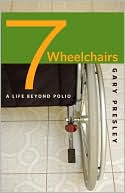

 |

|

The average rating for Seven Wheelchairs: A Life Beyond Polio based on 2 reviews is 5 stars.
Review # 1 was written on 2008-10-10 00:00:00 Brandon Le Brandon LeHey, I wrote the thing, and so I'm not even going to hint you shouldn't read it. I'll give you two reasons you might want to do so ... 1] It'll answer all the nosy little questions that lurk in the back of your mind when you see someone in a wheelchair. 2] It's a gentle reminder that all of us are riding out this life together, and we're an interesting mix of every human characteristic spread out of a great gray sliding scale upon which "disability" is but one marking point. Find it here, or on Amazon. |
Review # 2 was written on 2008-10-09 00:00:00 Joseph Jacques Joseph JacquesGary Presley took his last physical steps in 1959 when he was only seventeen. He contracted Polio from the Salk vaccine. It's ironic that he got it from the last in the series of immunizations meant to protect him from the very disease he contracted and it happened the very year that the Sabin vaccine, much safer than the Salk, was trial tested. Since then Presley has used a wheelchair to get around. In fact, he's gone through seven of them. Today he is a writer and mentor, an editor of the Internet Review of Books, and an activist in the disability community. It's been a long journey. His memoir Seven Wheelchairs: A Life Beyond Polio, published this year by University of Iowa Press, tells the story of his pilgrimage from innocent victim to angry and defiant adult, and ultimately to an accepting, if somewhat battered, philosopher. In his own words: "...cynical and unfeeling, a burnt-out case, which I attemptedattemptto explain away by saying I survived then and I survive now by mating an ignorant combination off existentialism and stoicism, by becoming a peculiar bastardized oddity rolling about the world, forever dependent." I found this book fascinating on many levels. I am Critical Care nurse by training and the book is an in depth look backward at the treatment of Polio. I am old enough to remember Stryker frames, used to rotate paralysis patients in the ICU, but the Iron Lung was obsolete long before my nursing career began. Presley's descriptions of "the can" and the treatment he received in hospital are riveting. I know from personal experience that many events that happened in his hospital stay would not be tolerated today. Nursing has come a long way since the 1960s. Simple acts such as turning a patient on a regular schedule would be done regardless of how reluctant or combative the patient might be, and Presley, by his own admission, was no easy patient. Anger and helplessness make for combative and frustrated patient. Sudden and irrevocable paralysis, a sentence. In the years I took care of new paraplegics and quads I always tried to engage them to talk about their frustrations. Perhaps it takes as long as it has taken Presley to get to the root of the issues, to open up and speak the truth about himself as well as the world of "Crips." Not only does he give us a look at treatments that now seem antiquated, but he uses his memoir to underscore the importance of the landmark Americans with Disabilities Act of 1990. How it changed, not only his world, but the world of thousands upon thousands of disabled people in the United States. Presley uses the words Gimp and Crip to describe himself and his fellow travelers, but don't ever let him hear you use the expression "wheelchair bound." For him and others in the disability world wheelchairs liberate rather than imprison. But fundamentally this memoir is a universal look into what disables us and what empowers us, regardless of whether we ride a wheelchair or not. As we travel the road with Presley we begin to see ourselves in his agony and frustration. We are all crippled to a degree by whatever limits our lives. What we do with that is how we ultimately live. Simply put, in Presley's words: "Of course, it is madness to regret what cannot be changed, and I now have learned to keep the madman locked away where he cannot hurt anyone." This is the trap door where we store our anger and blame once we have the maturity to understand that we are responsible for how we choose to live our lives. By the end of the memoir we watch Gary Presley find work, love, parenthood, and a life without rancor. "The paralyzed man miraculously found the ability to turn the other cheek, "'to live each day fully and gracefully.'" Some people might be afraid to pick this book up. Those same people might also be afraid to look hard into their own lives. Seven Wheelchairs: A Life Beyond Polio is a book that is educational on a political and social level as well as a personal one. It is well worth a read. |
CAN'T FIND WHAT YOU'RE LOOKING FOR? CLICK HERE!!!